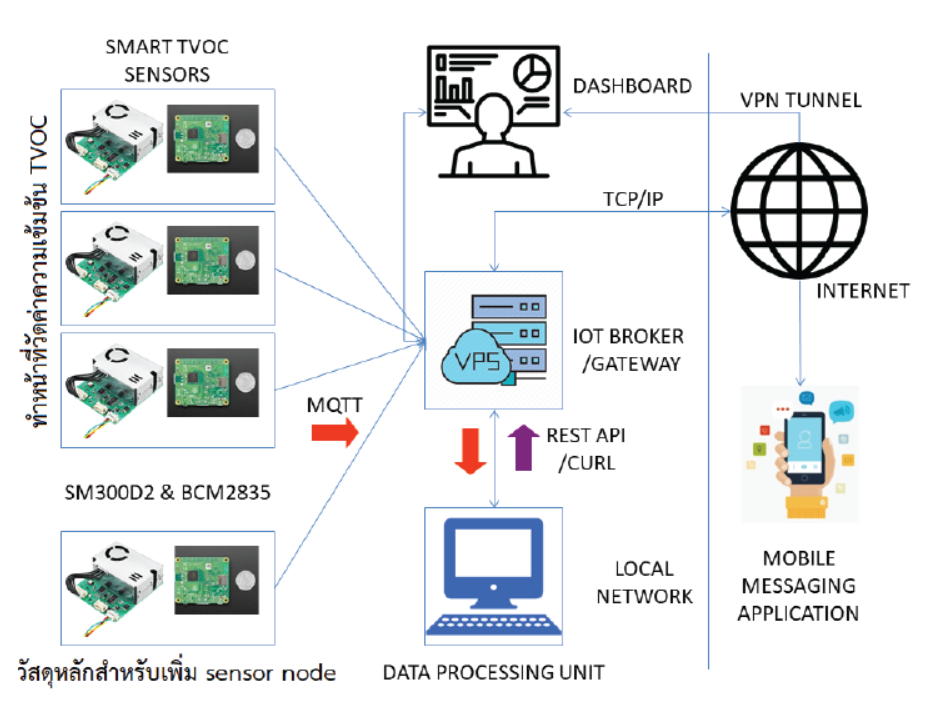Developing a simple distributed sensor system for automated online monitoring and alerting:Case study of TVOC sensor network system prototype development for real-time monitoring and alerting of air quality in operations
DOI:
https://doi.org/10.60136/bas.v11.2022.131Keywords:
TVOC, smart-sensor, real-time monitoring, air quality, mobile messenger applicationAbstract
This work demonstrates the development of a smart TVOC sensor network. A smart TVOC sensor system is designed using MOS type TVOC sensors, a logic level converter circuit, VPS and IoT-related open-source software including IoT broker, IoT gateway and MQTT API. The system is used as a prototype for smart sensors which plays a crucial role in the development of the cyber-physical system. The final spin-off of the development is capable to create near real-time TVOC concentration data records, online TVOC concentration reports on IoT dashboard, and online TVOC concentration reports on mobile messenger applications, making it more advantageous than traditional standalone TVOC detectors. By taking advantage of the development, a TVOC smart sensor could help control air pollution in the workspace becomes more efficient. Data from the system composed of 3 TVOC sensors, in this work, are collected and analyzed to replicate the measurement uncertainty model and covariance analysis within groups.The result shows that the system exhibits a weak correlation (R2< 0.9) which is commonly due to a tradeoff between the standalone sensor and distributed sensor. Consequently, data pre-processing and normalization are necessarily required for the further development of a smart TVOC sensor network.
References
ณัฏฐกานต์ เกตุคุ้ม, การสร้างแนวปฏิบัติการจัดการสารเคมีในห้องปฏิบัติการอย่างปลอดภัยสําหรับอุตสาหกรรม เคมีภัณฑ์ในประเทศไทย. Bulletin of Applied Sciences.2019, 8(8), 78-87.
UNITED STATES ENVIRONMENTAL PROTECTION AGENCY (U.S.EPA). Method TO-14A. Determination of volatile organiccompounds (VOCs) in ambient air using specially prepared canisters with subsequent analysis by gas chromatography.
UNITED STATES ENVIRONMENTAL PROTECTION AGENCY (U.S.EPA). Method TO-15. Determination of volatile organic compounds (VOCs) in air collected in specially prepared canisters and analyzed by gas chromatography-mass spectrometry (GC-MS).
กุลชาติ มีทรัพย์หลาก, ระบบไซเบอร์-กายภาพพื้นฐานสําคัญในการยกระดับเทคโนโลยี [online], [viewed 2022-01-01]. Available from: https://www.nectec.or.th/research/research-project/nectec-cps.html.
Mr. Digital.เทคโนโลยีเซนเซอร์ (Sensor Technology) [online]. Available from: https://ops.go.th/main/index. php/knowledge-base/article-pr/1520-sensor [viewed 2022-01-01].
สํานักอนามัยสิ่งแวดล้อม กรมอนามัย, คู่มือการปฏิบัติงานเพื่อการตรวจประเมินคุณภาพอากาศภายในอาคารสําหรับ เจ้าหน้าที. นนทบุรี: สํานักอนามัยสิ่งแวดล้อม กรมอนามัย, 2559.
สํานักอนามัยสิ่งแวดล้อมกรมอนามัย, คู่มือวิชาการ เรื่องสารอินทรีย์ระเหยง่ายในบรรยากาศ, กรุงเทพฯ: องค์การ สงเคราะห์ทหารผ่านศึกในพระบรมราชูปถัมภ์, 2555. ISBN 978-616-11-1333-9.
MOLHAVE, L. Volatile organic compounds, indoor air quality and health. Indoor Air, 1991, 1(4), 357-376. [9] LAWSON, Jon. How do you choose a VOC sensor [online]. Available from: https://www.engineerlive.com/content/how-do-you-choose-voc-sensor [viewed 2022-01-01].
อุมาพร สุขม่วง.การใช้ความสัมพันธ์เชิงเส้นในการประเมินวิธีทดสอบ.วารสารกรมวิทยาศาสตร์บริการ [online]. 2555, 60(188), 12-15. เข้าถึงจาก: http://lib3.dss.go.th/fulltext/dss_j/2555_60_188_p12-15.pdf [อ้างถึงวันที่ 1 มกราคม 2565].
RAJESH, G. and A. CHATURVEDI. Correlation analysis and statistical characterization of heterogeneous sensor data in environmental sensor networks. Computer Network. 2019, 164, 106902.
GROVER, A. and B. LALL. A Novel method for removing baseline drifts in multivariate chemical sensor. IEEE Transactions on Instrumentation and Measurement. 2020, 69(9), 7306-7316.
ROWE, E. G. and T. A. WETTERGREN. Coverage and reliability of randomly distributed sensor systems with heterogeneous detection range. International Journal of Distributed Sensor Networks. 2009, 5(4), 303-320.

Downloads
Published
How to Cite
Issue
Section
License
Copyright (c) 2022 Bulletin of Applied Sciences

This work is licensed under a Creative Commons Attribution-NonCommercial-NoDerivatives 4.0 International License.









